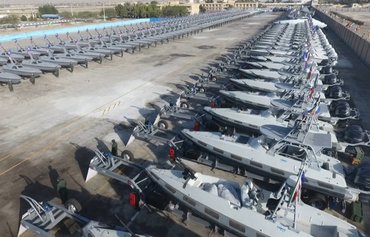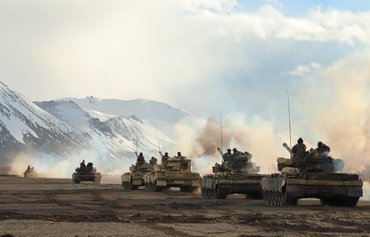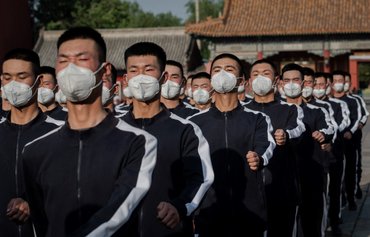The regimes of Iran and China have quietly drafted a major economic and security partnership that would clear the way for billions of dollars of Chinese investments in energy and other sectors.
But many observers say the 25-year agreement will bring about a host of negative effects for the region and beyond, as a weakened and cornered Iranian regime -- teetering on the brink of economic collapse, facing major domestic disillusionment with the ruling regime, and cut off from most of the world because of its ongoing pursuit of nuclear weapons and its arming of militias across the Middle East and South Asia -- will be at the mercy of an emboldened and assertive China.
The partnership, detailed in an 18-page proposed agreement, would vastly expand Chinese presence in banking, telecommunications, ports, railways and dozens of other projects, the New York Times reported July 11th. In exchange, China would receive a regular -- and, according to an Iranian official and an oil trader, heavily discounted -- supply of Iranian oil over the next 25 years.
The document describes deepening military co-operation, calling for joint training and exercises, joint research and weapons development and intelligence sharing, the report continued.
![A particular concern of the agreement has been the proposed port facilities in Iran, including two along the coast of the Sea of Oman, that could be used by the Chinese navy. China has already constructed a series of ports along the Indian Ocean, creating a necklace of refuelling and resupply stations from the South China Sea to the Suez Canal. Seen here are Chinese warships in the Pacific Ocean in 2019. [Chinese Navy]](/cnmi_am/images/2020/07/20/25043-pak2-600_384.jpg)
A particular concern of the agreement has been the proposed port facilities in Iran, including two along the coast of the Sea of Oman, that could be used by the Chinese navy. China has already constructed a series of ports along the Indian Ocean, creating a necklace of refuelling and resupply stations from the South China Sea to the Suez Canal. Seen here are Chinese warships in the Pacific Ocean in 2019. [Chinese Navy]
![Expanding Chinese assistance to Iran will mean Beijing will be providing direct support to Iran's IRGC, an arm of the Iranian military officially designated as a terrorist organisation. [Photo courtesy of Iranian Ministry of Defence]](/cnmi_am/images/2020/07/20/25044-funeral_iran-600_384.jpg)
Expanding Chinese assistance to Iran will mean Beijing will be providing direct support to Iran's IRGC, an arm of the Iranian military officially designated as a terrorist organisation. [Photo courtesy of Iranian Ministry of Defence]
Iranian Foreign Minister Mohammad Javad Zarif insisted there was "nothing secret" about the prospective China deal; however, it has not yet been submitted to Iran's parliament for approval or made public, stoking suspicions in Iran about how much the government is preparing to give away to Beijing, according to AFP.
The planned China deal has been a hot topic on Iranian social media with populist ex-president Mahmud Ahmadinejad last month also condemning negotiations under way with a foreign country.
Critics across the political spectrum in Iran have raised concerns that the government is secretly "selling off" the country in a moment of economic weakness and international isolation.
The nation would be informed "when an accord has been concluded", Zarif said, adding that the intention had already been made public in January 2016 when President Xi Jinping visited Tehran.
"Two ancient Asian cultures, two partners in the sectors of trade, economy, politics, culture and security with a similar outlook and many mutual bilateral and multilateral interests will consider one another strategic partners," the document says in its opening sentence, according to the New York Times.
Iran's supreme leader, Ayatollah Ali Khamenei, has come out publicly in support of a strategic partnership with China.
Particular alarm over military assistance
The agreement's expansion of military assistance, training and intelligence-sharing is arousing great alarm.
Expanding Chinese assistance to Iran will mean Beijing will be providing direct support to Iran's Islamic Revolutionary Guard Corps (IRGC), an arm of the Iranian military officially designated as a terrorist organisation.
The IRGC was formed after the 1979 Islamic revolution with a mission to defend the clerical regime, in contrast to more traditional military units that protect borders.
The IRGC has been linked to many terrorist events in the Middle East and beyond over the past several decades.
The IRGC's Quds Force, bearing the Arabic name for Jerusalem, specialises in foreign missions, providing training, funding and weapons to extremist groups, including Lebanon's Hizbullah and the Palestinian group Hamas.
The Quds Force has been pivotal in support of Syrian regime forces in that country's civil war.
In its quest to expand its regional influence and establish dominance, the Quds Force has been recruiting Afghan, Pakistani, Iraqi and Yemeni youth to fight for its interests in Syria.
This strategy is evidenced by the Fatemiyoun Division, a unit that recruited about 50,000 Afghan refugees between 2013 and 2017 to fight in Syria, and the Zainabiyoun Brigade, whose Pakistani elements receive IRGC training and weapons before Iran transports them to Syria to fight alongside other IRGC-affiliated factions and the Syrian regime.
Necklace of Chinese ports
The New York Times article, which can be seen in full here, says the critics have cited previous Chinese investment projects that have left countries in Africa and Asia indebted and ultimately beholden to the authorities in Beijing. A particular concern has been the proposed port facilities in Iran, including two along the coast of the Sea of Oman.
One at Jask, just outside the Strait of Hormuz, the entrance to the Persian Gulf, would give the Chinese a strategic vantage point on the waters through which much of the world's oil transits.
China has already constructed a series of ports along the Indian Ocean, creating a necklace of refuelling and resupply stations from the South China Sea to the Suez Canal. Ostensibly commercial in nature, the ports potentially have military value, too, allowing China's rapidly growing navy to expand its reach.
The US will treat Beijing's pursuit of resources in the dispute-rife South China Sea as illegal, said US Secretary of State Mike Pompeo Monday (July 13th).

![Iranian President Hassan Rouhani and Chinese President Xi Jinping review troops during a welcoming ceremony on January 23rd, 2016, in Tehran. The secretive pact between the two nations now being finalised reportedly began forming during this state visit. [STR/AFP]](/cnmi_am/images/2020/07/20/25042-pak1-600_384.jpg)






